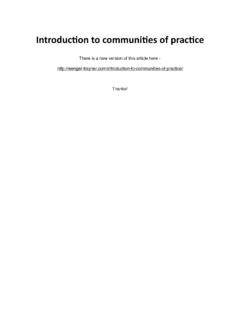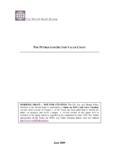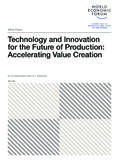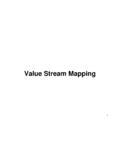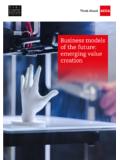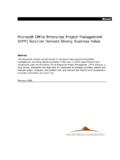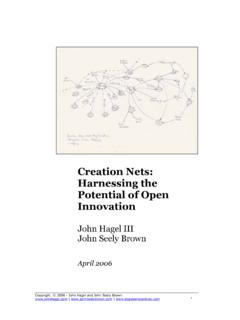Transcription of Promoting and assessing value creation in …
1 Rapport 18. Promoting and assessing value creation in communities and networks: a conceptual framework Etienne Wenger Beverly Trayner Maarten de Laat Ruud de Moor Centrum Ruud de Moor Centrum Open Universiteit Open Universiteit Rapport 18. Promoting and assessing value creation in communities and networks: a conceptual framework Etienne Wenger Beverly Trayner Maarten de Laat Ruud de Moor Centrum Ruud de Moor Centrum Open Universiteit Open Universiteit This publication is made possible with the financial support of the Dutch Ministry of Education, Culture and Science. Copyright 2011 Ruud de Moor Centrum All rights reserved No part of this publication may be reproduced, stored in or introduced into a retrieval system, or transmitted, in any form, or by any means (electronic, mechanical, photocopying, recording, or otherwise), without the prior permission of the publisher.
2 Requests for permission should be directed to ISBN: 978-90-358-1808-8. Printed in The Netherlands. 2. Contents Foreword 5. 1 Introduction 7. 2 communities and networks 9. Descriptions and distinctions 9. Two aspects of the social fabric of learning 10. Community and network as development processes 12. Complementarity of community and network structures 12. 3 Framing narratives 15. Personal and collective narratives 15. Narratives as accounts and as aspirations 16. 4 Cycles of value creation in networks and communities 19. Definitions 19. Reflecting on value creation : key questions 22. 5 Measures of value creation for each cycle 25. 6 value - creation stories 33.
3 value - creation stories: a special genre of stories 34. 7 Building a picture of value creation 37. Leveraging the complementarity of indicators and stories 37. Cumulative evidence 37. value - creation matrix: combining stories and indicators 39. 8 Toolkit: Telling stories about the value of communities and networks 41. The overall value narrative 42. Specific value - creation stories 45. 9 References 49. About the authors 50. Colophon 51. Previously published in this series 53. Promoting and assessing value creation in communities and networks: a conceptual framework 3. 4. Foreword The Open Universiteit Nederland (OUNL) partners with teacher education institutes and school organizations for the development and provision of teacher professional development.
4 Most of the expertise in teacher professional development takes place at the Ruud de Moor Centre (RdMC). This centre carries out practice-based research in teacher professional development and evaluates teacher-learning activities. In close collaboration with teachers and schools of primary, secondary and vocational education it also develops, disseminates and innovates (digital) instruments and toolkits for facilitating teacher professional development. The centre works closely with teacher education institutes and support organizations and departments within the OUNL focusing on informal learning in the workplace and providing scientific knowledge, instruments and services.
5 As well as offering its products online, the centre publishes research findings in their series called Ruud de Moor Centrum- rapporten'. Examples of publications in this series are dissertations, inaugural addresses, research papers, position papers, white papers, review papers, and practice-oriented papers for teachers and related practitioners. This series targets readers interested in teacher professional development who come from education, policy and research. This particular publication is about value creation in communities and networks. It is a foundation paper presenting a framework for Promoting and assessing value creation in communities and networks and aims to be sufficiently rigorous for researchers, useful for practitioners and informative for stakeholders.
6 To this end it includes a theoretical framework and toolkit for helping professionals to tell stories on the value that networks and communities create when they are used for learning and to articulate how these activities result in desired outcomes that improve teaching practice. I hope that professionals of other contexts will also find it helpful. (Jos) Kusters Msm Director Ruud de Moor Centrum Promoting and assessing value creation in communities and networks: a conceptual framework 5. 6. 1 Introduction This document presents a conceptual foundation for Promoting and assessing value creation in communities and networks. By value creation we mean the value of the learning enabled by community involvement and networking.
7 Therefore we focus on the value that networks or communities create when they are used for social learning activities such as sharing information, tips and documents, learning from each other's experience, helping each other with challenges, creating knowledge together, keeping up with the field, stimulating change, and offering new types of professional development opportunities. A useful framework should make it possible to assess value creation in a way that links specific activities to desired outcomes. Such linkage not only affords causal attribution for outcomes to the activities of communities and networks; it also gives some guidance about how to promote the creation of value proactively.
8 To this end, our framework includes both a set of relevant indicators for data collection and a process for integrating these indicators into a meaningful account of value creation . This requires a specific genre of stories, which we call value - creation stories. We include a toolkit with templates for telling and collecting such stories. Useful for researchers, participants, and organizations The purpose of this conceptual framework is to provide a foundation that is useful across a range of endeavors, including research and practice. The framework has to be both rigorous and flexible. It has to be rigorous enough to support the work of researchers: grounded in theory to ensure relevance and data-oriented to provide scientific validity and reliability.
9 At the same time the process of assessment is meant to be useful for participants in communities and networks as well as for organizational stakeholders. The framework should consist of categories that have enough intuitive appeal to make an assessment of value creation relevant across constituencies, including members, internal leaders and sponsors of these communities and networks. Community and network members need to recognize their own experience of participation in the results and the process of evaluation if they are to use it for reflection and guidance. Internal stakeholders include people who take leadership in cultivating communities and networks: the assessment should give them the information they need to make decisions about how to support the development of communities and networks and to maximize value creation .
10 The results should be useful and trustworthy for people and organizations that provide sponsorship to communities and networks, that is, to those who give them institutional legitimacy, ensure that they have the resources they need, negotiate strategic alignment, and provide an organizational ear when the outcome requires action on the part of an organization. These stakeholders need to make decisions about investment and institutionalization, which need to be based on reliable and informative data. Promoting and assessing value creation in communities and networks: a conceptual framework 7. Combine different sources and types of data communities and networks can generate all sorts of quantitative and qualitative data about their activities.
